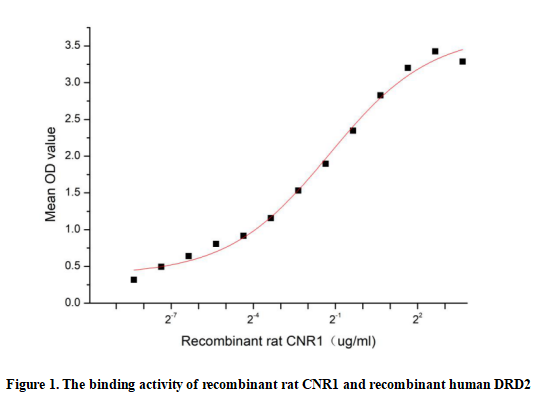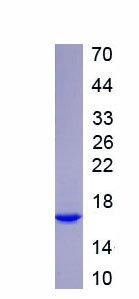Active Cannabinoid Receptor 1, Brain (CNR1)
CANN6; CB-R; CB1; CB1A; CB1K5; CNR
- Product No.APC950Ra01
- Organism SpeciesRattus norvegicus (Rat) Same name, Different species.
- Buffer FormulationPBS, pH7.4, containing 0.01% SKL, 5% Trehalose.
- Traits Freeze-dried powder
- Purity> 95%
- Isoelectric Point4.3
- ApplicationsCell culture; Activity Assays.
- DownloadInstruction Manual
- UOM 10µg50µg 200µg 1mg 5mg
- FOB
US$ 260
US$ 650
US$ 1300
US$ 3900
US$ 9750
For more details, please contact local distributors!
ACTIVITY TEST

Cannabinoid Receptor 1, Brain (CNR1), also known as CB1 receptor, is a type of G protein-coupled receptor found predominantly in the central nervous system. It is the primary receptor for cannabinoids, the active components of cannabis, and plays a key role in the physiological and psychoactive effects of cannabis. CNR1 is primarily localized to neurons in the brain, where it is involved in various functions, including pain sensation, memory, appetite, mood, and cognition.Dopamine Receptor D2 (DRD2) can interact with CNR1 to regulate the distribution of dopamine.Thus a functional ELISA assay was conducted to detect the interaction of recombinant rat CNR1 and recombinant human DRD2.Briefly, CNR1 was diluted serially in PBS with 0.01% BSA (pH 7.4). Duplicate samples of 100 μl were then transferred to DRD2-coated microtiter wells and incubated for 1h at 37℃. Wells were washed with PBST and incubated for 1h with anti-CNR1 pAb, then aspirated and washed 3 times. After incubation with HRP labelled secondary antibody for 1h at 37℃, wells were aspirated and washed 5 times. With the addition of substrate solution, wells were incubated 15-25 minutes at 37℃. Finally, add 50 µL stop solution to the wells and read at 450/630nm immediately. The binding activity of recombinant rat CNR1 and recombinant human DRD2 was shown in Figure 1, the EC50 for this effect is 0.43ug/mL.
USAGE
Reconstitute in 10mM PBS (pH7.4) to a concentration of 0.1-1.0 mg/mL. Do not vortex.
STORAGE
Avoid repeated freeze/thaw cycles. Store at 2-8°C for one month. Aliquot and store at -80°C for 12 months.
STABILITY
The thermal stability is described by the loss rate. The loss rate was determined by accelerated thermal degradation test, that is, incubate the protein at 37°C for 48h, and no obvious degradation and precipitation were observed. The loss rate is less than 5% within the expiration date under appropriate storage condition.
GIVEAWAYS
INCREMENT SERVICES
-
 BCA Protein Quantification Kit
BCA Protein Quantification Kit
-
 Molecular Mass Marker for Protein
Molecular Mass Marker for Protein
-
 Monoclonal Antibody Customized Service
Monoclonal Antibody Customized Service
-
 Polyclonal Antibody Customized Service
Polyclonal Antibody Customized Service
-
 Protein Activity Test Experiment Service
Protein Activity Test Experiment Service
-
 Electrophoretic Mobility Shift Assay (EMSA) Experiment Service
Electrophoretic Mobility Shift Assay (EMSA) Experiment Service
-
 Buffer
Buffer
-
 Lentivirus Packaging Experiment Service
Lentivirus Packaging Experiment Service
-
 Adenovirus Packaging Experiment Service
Adenovirus Packaging Experiment Service
-
 Real Time PCR Experimental Service
Real Time PCR Experimental Service
-
 Spike RBD Protein (S-RBD)
Spike RBD Protein (S-RBD)
-
 Protein G
Protein G
-
 Protein A
Protein A
| Magazine | Citations |
| Investigação da participação do sistema endocanabinoide no prejuízo do comportamento social em ratos expostos a status epilepticus neonatal |
| Catalog No. | Related products for research use of Rattus norvegicus (Rat) Organism species | Applications (RESEARCH USE ONLY!) |
| RPC950Ra01 | Recombinant Cannabinoid Receptor 1, Brain (CNR1) | Positive Control; Immunogen; SDS-PAGE; WB. |
| APC950Ra01 | Active Cannabinoid Receptor 1, Brain (CNR1) | Cell culture; Activity Assays. |
| PAC950Ra01 | Polyclonal Antibody to Cannabinoid Receptor 1, Brain (CNR1) | IHC |
| MAC950Ra21 | Monoclonal Antibody to Cannabinoid Receptor 1, Brain (CNR1) | WB; IHC; ICC; IP. |
| SEC950Ra | ELISA Kit for Cannabinoid Receptor 1, Brain (CNR1) | Enzyme-linked immunosorbent assay for Antigen Detection. |
| LMC950Ra | Multiplex Assay Kit for Cannabinoid Receptor 1, Brain (CNR1) ,etc. by FLIA (Flow Luminescence Immunoassay) | FLIA Kit for Antigen Detection. |







